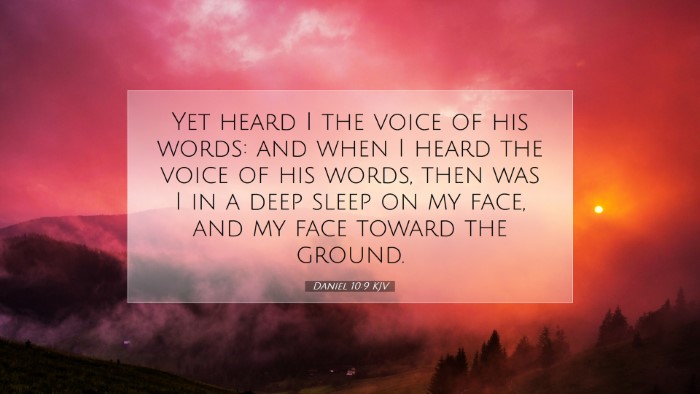Old Testament
Genesis Exodus Leviticus Numbers Deuteronomy Joshua Judges Ruth 1 Samuel 2 Samuel 1 Kings 2 Kings 1 Chronicles 2 Chronicles Ezra Nehemiah Esther Job Psalms Proverbs Ecclesiastes Song of Solomon Isaiah Jeremiah Lamentations Ezekiel Daniel Hosea Joel Amos Obadiah Jonah Micah Nahum Habakkuk Zephaniah Haggai Zechariah MalachiDaniel 10:9
Daniel 10:9 KJV
Yet heard I the voice of his words: and when I heard the voice of his words, then was I in a deep sleep on my face, and my face toward the ground.
Daniel 10:9 Bible Commentary
Commentary on Daniel 10:9
Daniel 10:9 states, "Yet heard I the voice of his words: and when I heard the voice of his words, then was I in a deep sleep on my face, and my face toward the ground." This verse captures a profound experience in Daniel's prophetic ministry, where the weight of divine revelation impacts him physically, highlighting both the transcendence of the divine and the frailty of human nature.
Historical Context
The Book of Daniel, positioned in the latter part of the Old Testament, reflects a time of exile for the Jewish people. Daniel, a captive in Babylon, has been appointed to serve in high governmental positions while maintaining his allegiance to God. This setting of tension between earthly powers and divine authority serves as a backdrop for the intense experiences Daniel endures. Spiritual warfare and the activity of angelic beings become a significant part of his revelations.
Insights from Public Domain Commentaries
Matthew Henry's Commentary
Matthew Henry points out that the experience of Daniel signifies a deep state of vulnerability in spiritual encounters. The term "deep sleep" indicates a state where Daniel is overwhelmed by the divine presence, a common theme where mortals confront the manifestations of God. This state suggests not only physical fatigue but also reflective humility before God. He notes that the vision conveys both glory and terror, showcasing God's holiness and majesty.
Albert Barnes' Notes on the Bible
Albert Barnes elaborates on the notion that Daniel's face "toward the ground" symbolizes submission and reverence. It reflects a posture common throughout Scripture where individuals encounter divine messengers. Barnes emphasizes that Daniel's reaction is an acknowledgment of the overwhelming power and holiness of the figure speaking to him. Furthermore, the voice of the messenger signifies the importance of divine communication, underscoring that God often uses intermediaries to convey His will to humanity. The essence of listening is paramount in spiritual discernment, as Daniel demonstrates in this moment of deep sleep yet attentive to the voice.
Adam Clarke's Commentary
Adam Clarke provides a further exploration of the implications of this verse. He suggests that the "deep sleep" referenced here should not be taken as an ordinary sleep, but rather as a trance-like state that indicates the seriousness of the revelation. Clarke offers insights into how such experiences are intended to awaken spiritual fervor within believers. The physical reaction of being "on my face" aligns with numerous instances in Scripture where God’s presence produces a sense of awe that compels humility (e.g., Isaiah 6:5). Clarke highlights the significance of receptive posture in prayer and worship, providing a model for contemporary believers.
Theological Reflections
This verse serves as a vital lesson on the nature of receiving divine truth. The encounter is layered with meaning; it speaks to the necessity of being spiritually prepared to encounter God’s messages and the grace that enables us to respond to His communication. There is a powerful connection between hearing the voice of God and humility before Him. Each commentary reflects a common thread: the need for preparation of the heart and mind when approaching the sacred, as Daniel exemplified.
Practical Applications
- Posture of Worship: Believers are encouraged to adopt a posture of humility and reverence when approaching God in prayer, recognizing His majesty.
- Listening to God's Voice: The importance of being attentive to God's voice amidst distractions. As with Daniel, a focused heart can discern divine communication.
- Preparation for Revelation: The need for personal spiritual discipline in reading Scripture, prayer, and fasting to be ready to encounter God.
- Sharing God's Message: Like Daniel, individuals should be prepared to share insights received from God, understanding the responsibility that comes with divine clarity.
Conclusion
In Daniel 10:9, we find a profound intersection of divine revelation and human response, illustrating the nature of God’s voice and the necessity of human humility. Through the insights of Matthew Henry, Albert Barnes, and Adam Clarke, this commentary reveals how God’s encounters with humanity compel a response of reverence, readiness, and reflection. For pastors, students, and scholars, this passage challenges and inspires them to cultivate a deep, responsive posture towards the divine, harmonizing faith with practice in their spiritual walks.


